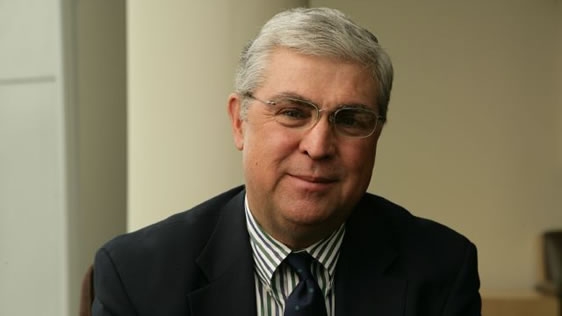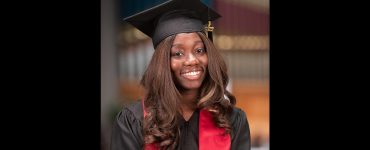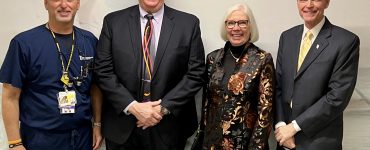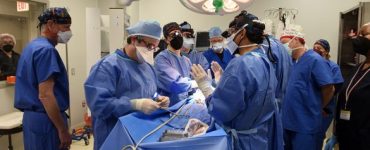With over 40 years of leadership roles in Maryland’s higher education community and 45 years of leadership experience in venture capital and economic development in the greater Baltimore area, John C. Weiss III, MBA, brings unique and valuable insight to the University of Maryland, Baltimore (UMB) Foundation Board of Trustees. Weiss was one of the original members of the UMB Board of Visitors in 1995, until it was dissolved and the foundation was established in 2000. Weiss, an alumnus of Baltimore City College, received a bachelor’s degree from Towson University and an MBA from Loyola College of Maryland.

Beginning his career in commercial banking and moving into the venture capital and biotech fields, Weiss was elected to the board of directors of Chesapeake Biological Laboratories, Inc., in 1986 after serving as a consultant for several years. During his term as president (1996-98), he led a successful public offering of the company’s stock and relocated and expanded the firm to South Paca Street, which is the current location of Emergent BioSolutions. Additionally, he helped to establish a model program that successfully trains and places laboratory technicians in jobs in the biotechnology industry, which is now the nonprofit BioTechnical Institute of Maryland, Inc. He was the founding managing director of the Maryland Venture Capital Trust, responsible for the organization, fundraising, managing, and investing of $19.1 million of this first-of-its-kind fund. In the early 2000s, Weiss was recruited by the Mayor’s Search Committee to be the founding executive director of the City of Baltimore’s Parking Authority and appointed as a member of the Baltimore mayor’s cabinet.
Today, Weiss is a senior lecturer for finance and entrepreneurship at the University of Baltimore’s (UBalt) Merrick School of Business and recently was appointed coordinator of real estate development for UBalt. He remains the chairman of the BioTechnical Institute of Maryland and is involved in many boards that contribute to the economic well-being of Baltimore, such as the Baltimore Workforce Development Board, Engineering Society of Baltimore, Keswick Multi-Care, the Lexington Market, Inc., and Baltimore Public Markets Corporation, and the Baltimore City Community College Board of Trustees.
SPOTLIGHT: How did you first get involved with UMB?
JOHN WEISS: I was in the venture capital business looking at technology transfer deals across Baltimore and working with UMB and Johns Hopkins University [JHU]. Then I transitioned over to being president of a biotech company and met Hal Chappelear, who was involved in the School of Pharmacy. He wanted to see if there was something we could do together in the biotech field. At the same time, I was chairman and one of the founders of the Greater Baltimore Technology Council and connected with Mark Sargent, who was the director of the Law and Entrepreneurship Program at the School of Law. He was working on a legal clinic for early-stage companies and published a primer for young companies to navigate legal issues. And through those various connections, Dr. David Ramsay [UMB president from 1994 to 2010] tapped me and asked me to join the Board of Visitors. That was 27 years ago.
During that time, between UMB, Johns Hopkins, and the federal lab presence, the visibility of the life sciences in the business community was slowly increasing. In 1997, I was running Chesapeake Biological Laboratories and met Dr. Margaret Penno, a JHU researcher, who devised a curriculum for non-degreed students to train to be lab workers in the life sciences sector. I assisted with recruiting people from the Empowerment Zones, a designation I worked on with others to obtain from the Clinton administration for areas of Baltimore, and it was a success. It became the BioTechnical Institute of Maryland and today works closely with UMB and the BioPark. And I’m still on the board!
How have UMB and the greater higher education landscape in Baltimore changed throughout your years of service?
The language has changed. The term “anchor institution” didn’t exist to the extent that it is used today. In the economic development world, the language has changed in how they talk about Baltimore. If you go back to the early part of the last century, Baltimore was the printing capital of the U.S. and also had a strong manufacturing sector. As they both started to diminish, the language of “Eds and Meds” started creeping into the dialogue, and now it’s how the greater Baltimore metropolitan area is routinely described. Now we have two major bioparks in Baltimore as well as the University of Maryland, Baltimore County’s Research and Technology Park and the University of Maryland, College Park’s Discovery District. These are major steps forward for higher education because it puts these campuses in a different business. Although complementary to their core mission, it is still a very different step to enter the business world and utilize public and private sector dollars to build these parks. These are permanent additions to the landscape, which to me is a hugely positive signal.
How can we create better partnerships between UMB and other anchor institutions in Baltimore?
One of the things I’ve learned over the years is that there are a lot more partnerships going on that nobody knows about. For example, UMBC has a wonderful undergraduate degree in social work, and many of those graduates come to UMB for their master’s and PhD. UBalt has a great undergrad real estate program and Johns Hopkins has a great master’s program. There are partnerships with JD and MBA programs, etc. Then there are partnerships with the business community that bring researchers and academic institutions together with corporations. All of these partnerships need to be better known, especially in Annapolis so the legislature and the executive branch know the important role UMB and others play outside the classroom.
Which causes at UMB do you think have a special impact?
Ever since Dr. Jay Perman launched the UMB CURE Scholars Program, my wife and I have been real cheerleaders for that program, and we still are. I just can’t say enough good things about it. I would like to see it replicated in East Baltimore with Johns Hopkins, and maybe the two programs have a little intellectual rivalry with each other. I think the CURE program has proven its worth and value, and I would like to see it continue, to lift up people across the metro area.
What are the biggest challenges facing students today?
Tuition is a challenge, regardless of where they go, even community college. Then the pandemic and inflation, it’s just hard. There are lots of financial aid packages, but it’s still hard. I’m not faulting higher education for this, it just pulls at my heartstrings when you see these young people going to school, working hard, but they can’t get into freshman [college] courses because their high school training was not sufficient, so they use their Pell Grants or other aid and they run out before they even take their college course, through no fault of their own. I think those are huge challenges and are not unique to Baltimore.
What is your hope for the future of higher education?
I hope that its star continues to burn brightly — that it becomes more accessible at all levels, not just for high school graduates, but also for people who want to go into various professions. Look at the nursing shortage we’ve been experiencing, not just because of the pandemic. I mean, this has been a topic of conversation for the last dozen years. As a Baby Boomer and part of the largest generation ever, the demand for health care professionals is only going to increase for the next 25 years. And I think higher ed should be looking at those demographics and funding sources, and we should be preparing for that.
Why do you give to UMB?
The value system at UMB is so good and the people are wonderful, but public universities need private support. There is still this myth that because they are public institutions, they don’t need private support. UMB has been successful in earning private support, but looking at all the private institutions around the country that we compete with when it comes to academics and research, we should be able to compete with them in fundraising as well.
UMBF, Inc., is a tax-exempt corporation, exempt from federal income tax under Section 501(c)(3) of the Internal Revenue Code and recognized by UMB’s governing board as an affiliated foundation of UMB.







Add comment